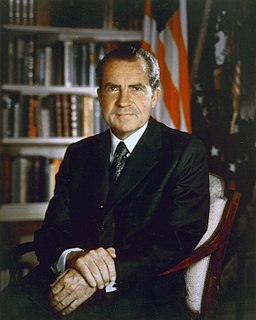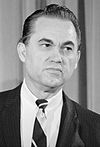
The 1964 United States presidential election was the 45th quadrennial American presidential election. It was held on Tuesday, November 3, 1964. Incumbent Democratic President Lyndon B. Johnson defeated Barry Goldwater, the Republican nominee. With 61.1% of the popular vote, Johnson won the largest share of the popular vote of any candidate since the largely uncontested 1820 election.

George Corley Wallace Jr. was the 45th Governor of Alabama, a position he occupied for four terms, during which he promoted "low-grade industrial development, low taxes, and trade schools". He sought the United States presidency as a Democrat three times, and once as an American Independent Party candidate, unsuccessfully each time. He is best remembered for his staunch segregationist and populist views. Wallace was known as "the most dangerous racist in America" and notoriously opposed desegregation and supported the policies of "Jim Crow" during the Civil Rights Movement, declaring in his 1963 inaugural address that he stood for "segregation now, segregation tomorrow, segregation forever".

James Douglas Martin was an American businessman and Republican politician from the U.S. state of Alabama, who served a single term in the United States House of Representatives from 1965 to 1967. His 1962 campaign for the United States Senate against the Democrat J. Lister Hill was the first serious showing by a member of his party in Alabama since Reconstruction.
Charles Woods was an Alabama businessman and broadcaster, and aspiring politician. Woods was raised in an orphanage. He enlisted in the Royal Canadian Air Force before joining the U.S. Army Air Corps in World War II. He was a decorated pilot with the Air Corps.
The Alabama Democratic Party is the affiliate of the Democratic Party in the state of Alabama. It is chaired by Nancy Worley.

The Alabama gubernatorial election of 1958 was held on November 3, 1958. Incumbent Democrat Jim Folsom was term limited and could not seek a second consecutive term.

The 1996 United States Senate election in Alabama was held on November 5, 1996. Incumbent Democratic U.S. Senator Howell Heflin decided to retire. Republican Jeff Sessions won the open seat, becoming just the second Republican U.S. Senator elected to represent Alabama since Reconstruction.

The Arkansas gubernatorial election of November 8, 1966 was the first time since Reconstruction that a member of the Republican Party was elected governor.

The 1968 United States elections was held on November 5, and elected members of the 91st United States Congress. The election took place during the Vietnam War, in the same year as the Tet Offensive, the assassination of Martin Luther King, Jr., and the protests of 1968. The Republican Party won control of the presidency and picked up seats in the House and Senate, although the Democratic Party retained control of Congress.

Elections in Alabama are authorized under the Alabama State Constitution, which establishes elections for the state level officers, cabinet, and legislature, and the election of county-level officers, including members of school boards.
Elections in the Southern United States are a composite or summary of elections is each of its component states.

The 1968 United States presidential election in New Mexico took place on November 5, 1968. All fifty states and The District of Columbia, were part of the 1968 United States presidential election. New Mexico voters chose four electors to represent them in the Electoral College, who voted for president and vice president.

The 1968 United States presidential election in New Hampshire took place on November 5, 1968, as part of the 1968 United States presidential election, which was held throughout all 50 states and the District of Columbia. Voters chose 4 representatives, or electors to the Electoral College, who voted for president and vice president.

The 1968 United States presidential election in Virginia took place on November 5, 1968. All fifty states and the District of Columbia were part of the 1968 United States presidential election. Virginia voters chose twelve electors to the Electoral College, which selected the president and vice president of the United States.

The 1978 Alabama gubernatorial election took place on November 7, 1978, to elect the Governor of Alabama. Incumbent Democratic Governor George Wallace did not run for re-election. Fob James, a businessman who had switched from the Republican Party to the Democratic Party and campaigned as a "born-again Democrat", won the Democratic primary in an upset over Attorney General Bill Baxley. He went on to defeat Guy Hunt in a landslide in the general election. Incumbent Democrat George Wallace was term limited and could not seek a third consecutive term.

The Alabama gubernatorial election of 1966 took place on November 8, 1966, and saw the election of Lurleen Wallace as Governor over U.S. Representative James D. Martin. Incumbent Democrat George Wallace was term limited and could not seek a second consecutive term.

The 1968 United States presidential election in Florida was held on November 5, 1968. Florida voters chose fourteen electors, or representatives to the Electoral College, who voted for president and vice president.

The 1964 United States presidential election in Indiana took place on November 3, 1964, as part of the 1964 United States presidential election. Indiana voters chose thirteen representatives, or electors, to the Electoral College, who voted for president and vice president.























